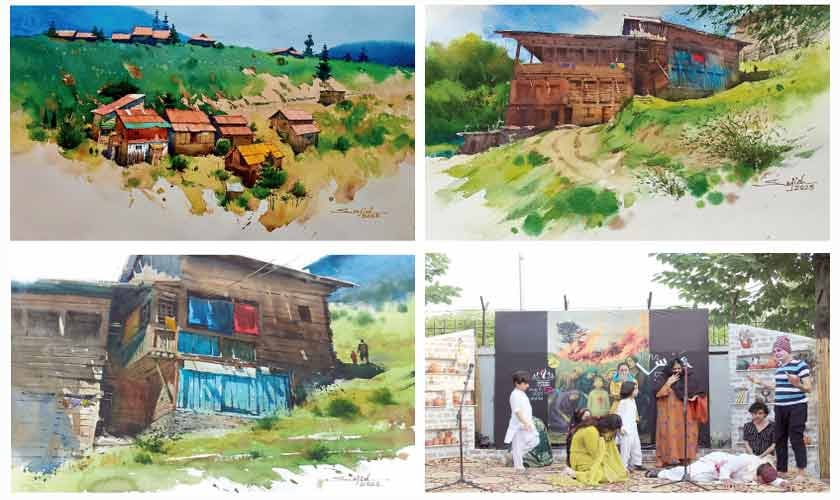Peshawar: A Vibrant Hub of Literary and Cultural Heritage
Peshawar is an ancient city steeped in history, culture, and diversity—a vibrant hub for literary and cultural activities. Nestled at the crossroads of Central Asia and the Indian subcontinent, Peshawar has long been a melting pot of civilizations, from the Gandharan era to the Mughal period and beyond. This rich historical tapestry, coupled with its resilient Pashtun identity, has fostered a dynamic environment where literary and cultural activities thrive, serving as a bridge between tradition and modernity.
**Revival of Literary Activities**
After a long heat spell subsided, the city has resumed its literary and cultural activities with renewed energy. Literary events in Peshawar, such as mushairas (poetry recitals), book fairs, and storytelling sessions, play a pivotal role in preserving the region’s linguistic heritage. These events provide platforms for poets, writers, and scholars to express ideas, share narratives, and engage with pressing social issues.
Pashto, Hindko, and Urdu poetry—deeply rooted in themes of love, honour, and resistance—resonate profoundly with the city’s ethos. The literature produced in the region reflects both local and cosmopolitan influences. Institutions like the Abasin Arts Council and various literary circles foster intellectual discourse, nurture young talent, and encourage creative expression.
**A Kaleidoscope of Traditions**
Culturally, Peshawar is a kaleidoscope of traditions. The city’s pluralistic identity has long been celebrated, with cultural events not only providing entertainment but also strengthening communal bonds. These gatherings offer a vital space for dialogue in a region often marked by conflict.
Landmarks such as the Peshawar Museum, which houses numerous Gandharan artifacts and hosts cultural festivals, highlight the city’s historical significance. These venues attract scholars and tourists alike, showcasing Peshawar as a center of cultural richness.
**The Role of Literature Amid Challenges**
Literary and cultural activities in Peshawar extend beyond mere entertainment; they are essential for preserving heritage, fostering resilience, and promoting social cohesion. In a city that has faced challenges like militancy, these activities provide a creative outlet for healing and expression, ensuring that Peshawar remains a beacon of intellectual vitality in the region.
**Honouring Professor Dr Nazir Tabassum**
Recently, Halqa Arbab-i-Zauq, Peshawar, organised a literary conference to honour the services of Professor Dr Nazir Tabassum (d. 2025), a distinguished Urdu poet, scholar, and teacher. Born Nazir Ahmad, Dr Tabassum earned his MA in Urdu from Peshawar University in 1974 and completed his PhD in 2003. His doctoral thesis, *Urdu Ghazal Poets of the Frontier After the Creation of Pakistan*, won acclaim for its scholarly depth.
Dr Tabassum’s poetry, marked by emotional depth and social reflection, resonated with wide audiences. His collections—*Tum Udaas Mat Hona* (1996), *Kaisay Raigan Huye Hum*, and *Abhi Mausam Nahin Badla*—explore personal and cultural themes often reflective of Peshawar’s ethos. His verses, featured on platforms like Rekhta, blend introspection with contemporary issues, earning him a revered place in Urdu poetry.
As a member of Halqa-i-Arbab-i-Zauq—a literary movement founded in 1939 in Lahore known for its non-political focus and innovative poetic styles—he actively engaged in poetic gatherings and critical discussions, contributing significantly to the modernist Urdu literary tradition. His clarity and emotional resonance were widely praised.
Dr Tabassum’s untimely death from a heart attack during a mushaira at Peshawar Services Club in August 2025 was mourned as an irreparable loss. Prominent literary figures, including Khyber Pakhtunkhwa’s Culture Department Secretary Dr Abdul Samad and federal minister Aurangzeb Khichi, lauded his contributions. Halqa-i-Arbab-i-Zauq and Dosti Welfare Organisation organized an event to honour his legacy as a literary icon.
**Intellectual Engagement: The Peshawar Circles**
The Peshawar Circles, a group of university graduates, recently held its 51st study circle at the Incubation Centre. The session featured a discussion on the book *AI Snake Oil: What Artificial Intelligence Can Do* by Arvind Narayanan and Sayash Kapoor. This book critically examines the hype surrounding artificial intelligence, pointing out its limits and societal implications.
Keynote speaker Faisal Jamil and moderator Hamza Bin Anees highlighted salient features of the book and encouraged young readers to explore innovative ideas and find practical applications. The book categorizes AI into two types: generative and predictive. Generative AI, such as chat bots like ChatGPT and image generators, excels at creating human-like outputs but often struggles with factual accuracy, sometimes producing hallucinations or plausible but false information.
Narayanan and Kapoor emphasize that AI’s allure stems from its seemingly magical versatility, largely due to exaggerated marketing by tech companies and consultants. The authors advocate a critical approach to AI adoption, urging stakeholders, policymakers, businesses, and the public to demand evidence of efficacy and consider ethical implications seriously.
**Cultural Initiatives by Mafkoora**
Mafkoora, a private organisation focused on research and development, recently staged a Pashto play addressing themes of peace, climate change, and the right to free expression. Hayat Roghani, head of Mafkoora, explained that live theatre is part of a broader series of cultural activities planned for the year. He emphasized that live performance is an effective medium for promoting social causes such as peace and environmental concerns.
Additionally, Mafkoora organised a session on the Big Bang Theory, further contributing to intellectual and cultural discourse in the city.
**Artistic Expressions and Heritage Preservation**
Ali Sajid, a noted watercolor artist based in Peshawar and president of the National Artists Association of Pakistan’s Khyber Pakhtunkhwa chapter, recently released his latest work online. His new collection features a painting of the pre-flood Gurez Valley of Azad Jammu and Kashmir.
Speaking about the painting, Sajid highlighted that such pre-flood images could be instrumental in efforts to rebuild and reclaim the region’s landscape, preserving both its natural beauty and cultural significance.
—
Peshawar continues to be a vibrant center where history, culture, and innovation meet. Through its literary and cultural activities, the city preserves its rich heritage while fostering resilience and social cohesion, ensuring a promising future that honours its storied past.
https://www.thenews.com.pk/tns/detail/1345121-an-active-autumn
